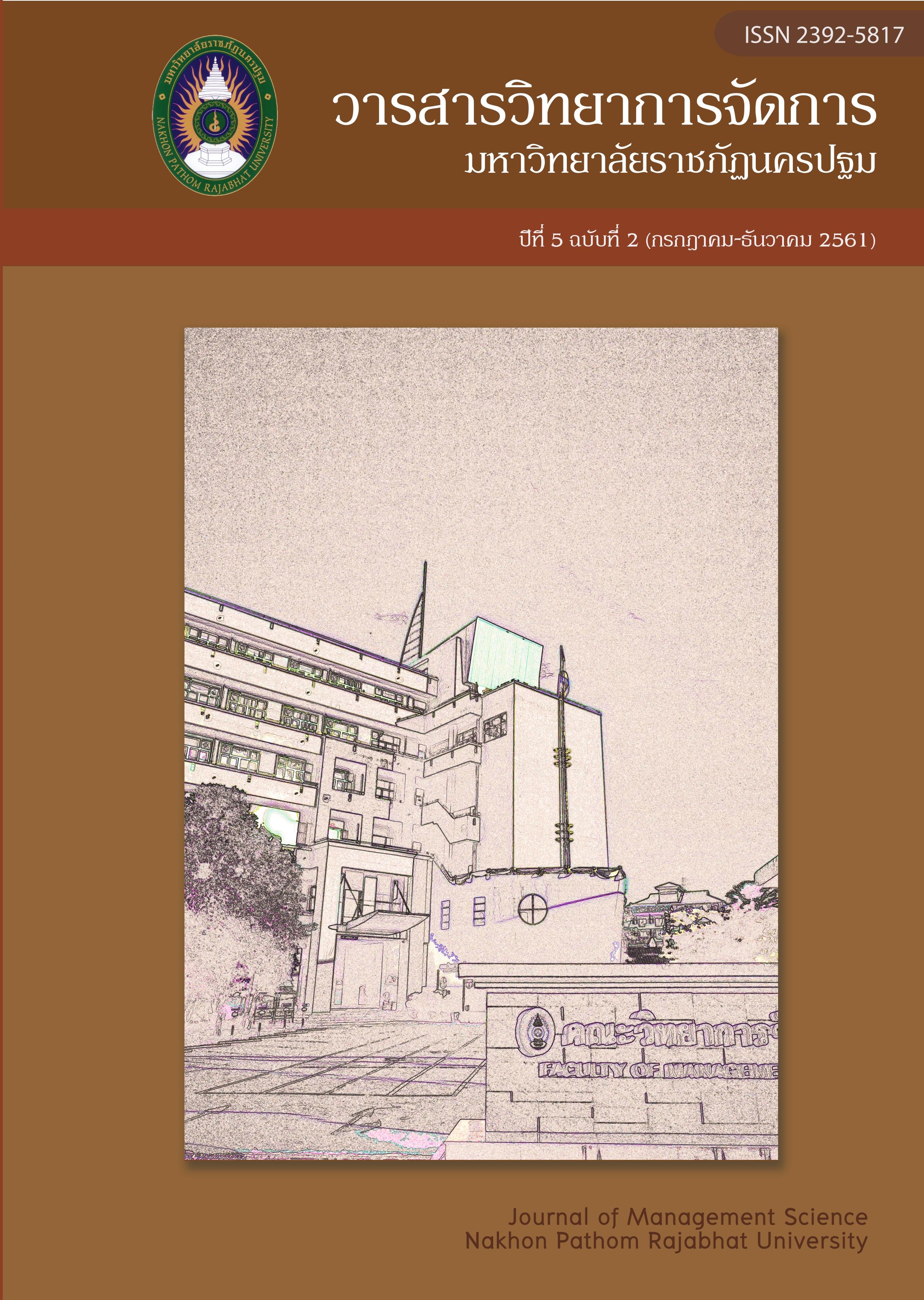Operational motivation of low cost airlines’s pilots in Thailand.
Main Article Content
Abstract
The purposes of this research are to study 1) operational motivation of low cost airlines’ pilots in Thailand in term of motivational and hygiene factors and 2) personal factors which are sex, age, marital status, education, job position, commercial pilot experiences affecting the operational motivation of pilots in low cost airlines in Thailand. By using Herzberg’s two – factors theory of motivation is as a research framework. The samples of this study are 1,248 pilots selected from low cost airlines operating at Donmuang Airport, Thailand which are Thai Air Asia and Thai Lion Air. The convenience sampling from Taro Yamane formula is applied to get 291 samples. The data are collected by using 5 - rating scale questionnaires. The statistics used in this study are frequency, percentage, mean, standard deviation, t-test and One-way ANOVA.
The findings reveal that operational motivation of low cost airlines’ pilots in Thailand in term of motivational factors are at high level as an overall. When considering each aspect, responsibility is at high level, followed by achievement, the work itself, recognition and advancement respectively. Moreover, the hygiene factors which show the overall image at high level. When considering each aspect, interpersonal relation is at high level followed by working environment, supervision, salary and company policy and supervision respectively. The result of hypothesis testing is personal factors and motivation showing that age, marital status, job position and commercial pilot experiences affect the motivation of pilot’s performance.
Article history : Received 4 June 2018
Revised 11 October 2018
Accepted 1 November 2018
SIMILARITY INDEX = 0.00
Article Details
The views and opinions of the article appearing in this journal are those of the author. It is not considered a view and responsibility of the editorial staff.
References
กมลพร กัลยาณมิตร. (2559, กันยายน). แรงจูงใจ 2 ปัจจัย พลังสู่ความสำเร็จ. วารสารวไลยอลงกรณ์ปริทัศน์ (มนุษยศาสตร์และสังคมศาสตร์), 6(3), 51-6.
ชัชชัย แจ่มจันทร์, ปรีชา เจ็งเจริญ และจักรพันธุ์ วงษ์บูรณาวาทย์. (2558). การวิเคราะห์อิทธิพลของปัจจัยจูงใจ ปัจจัยสุขอนามัย การสื่อสารภายในองค์กร และวัฒนธรรมองค์กรที่ส่งผลต่อแรงจูงใจของพนักงานภายในองค์การ. วารสารมหาวิทยาลัยราชภัฏมหาสารคาม (มนุษยศาสตร์และสังคมศาสตร์), 9(3), 75-87.
ทองฟู ศิริวงศ์. (2555). พฤติกรรมองค์การ. กรุงเทพฯ : จามจุรีโปรดักส์.
ภูษณิศา เมธาธรรมสาร. (2549). คุณภาพชีวิตในการทำงานของนักบินบริษัทไทยแอร์เอเชีย จำกัด. วิทยานิพนธ์ปริญญามหาบัณฑิต สาขาวิชารัฐศาสตร์ ภาควิชารัฐศาสตร์และรัฐประศาสนศาสตร์ มหาวิทยาลัยเกษตรศาสตร์.
มัณฑิรา มาศเมธา. (2557). ปัจจัยค้ำจุนที่มีผลต่อการคงอยู่ของพนักงานโรงพยาบาลกล้วยน้ำไท 1.การค้นคว้าอิสระปริญญาวิทยาศาสตร์มหาบัณฑิต. สาขาวิชาการจัดการทรัพยากรมนุษย์วิทยาลัยบัณฑิตศึกษาด้านการจัดการ. มหาวิทยาลัยศรีปทุม.
วรรณโชค ไชยสะอาด. (2559). เจาะลึก "เส้นทางนักบิน" อาชีพในฝันที่กำลังขาดแคลน. สืบค้นเมื่อ 21กุมภาพันธ์ 2559 จาก https://www.posttoday.com/analysis/report/417404.
สายการบินไทยแอร์เอเชีย,ฝ่ายปฏิบัติการบิน. (2561). สัมภาษณ์จากบุคลากรฝ่ายปฏิบัติการบิน.
สายการบินไทยไลอ้อนแอร์,ฝ่ายมาตรฐานการบิน. (2561). สัมภาษณ์จากบุคลากรฝ่ายมาตรฐานการบิน.
อรพินทร์ ชูชม. (2558). แรงจูงใจในการทำงาน: ทฤษฎีและการประยุกต์. วารสารจิตวิทยามหาวิทยาลัยเกษมบัณฑิต, 2(2), 52-61.
เขมิกา กิตติพงศ์. (2558). ปัจจัยจูงใจในการปฏิบัติงานของพนักงานบริษัทกรุงไทยธุรกิจบริการ จำกัดสำนักงานใหญ่ อาคารสุขุมวิท. วารสารวิชาการการตลาดและการจัดการ มหาวิทยาลัย.เทคโนโลยีราชมงคลธัญบุรี, 2(2), 51-62.
เพ็ญภพ พันธุ์เสือ. (2556). ความสุขในการทำงานของนักบิน บริษัท การบินไทย จำกัด(มหาชน). (วิทยานิพนธ์ปริญญามหาบัณฑิต). จุฬาลงกรณ์มหาวิทยาลัย. คณะแพทย์ศาสตร์. สาขาวิชาสุขภาพจิต.ภาควิชาจิตเวชศาสตร์.
Advance Aviation. (2015). บินวันนี้ ปลอดภัยกว่าวันวาน. Retrieved November 18, 2015 from https://advanceaviationblog.wordpress.com.
AIRBUS. (2015). Airbus Global Aviation Market Forecast 2015-2034. Retrieved December 2, 2016 from https://www.slideshare.net/reyyandemir/global-market-forecast20152034.
Aviation Voice. (2016). Aviation Future: Pilot Shortage and New Deliveries. Retrieved April 19, 2016 from https://aviationvoice.com/aviation-future-pilot-shortage-and-new-deliveries-201604191541.
BOEING. (2018). Pilot Outlook: 2018 – 2037. Retrieved April 28, 2018 from https://www.boeing.com/commercial/market/pilot-technician-outlook/2018-pilot-outlook/
Herzberg, F, Mausner, B., & Snyderman, B. B. (1959). The Motivation to Work. (2thed.) New York : John Wiley & Sons.
Management Study Guide. (2016). Herzberg’s Two-Factor Theory of Motivation. Retrieved August 10, 2016 from https://www.managementstudyguide.com/herzbergs-theory-motivation.htm.


